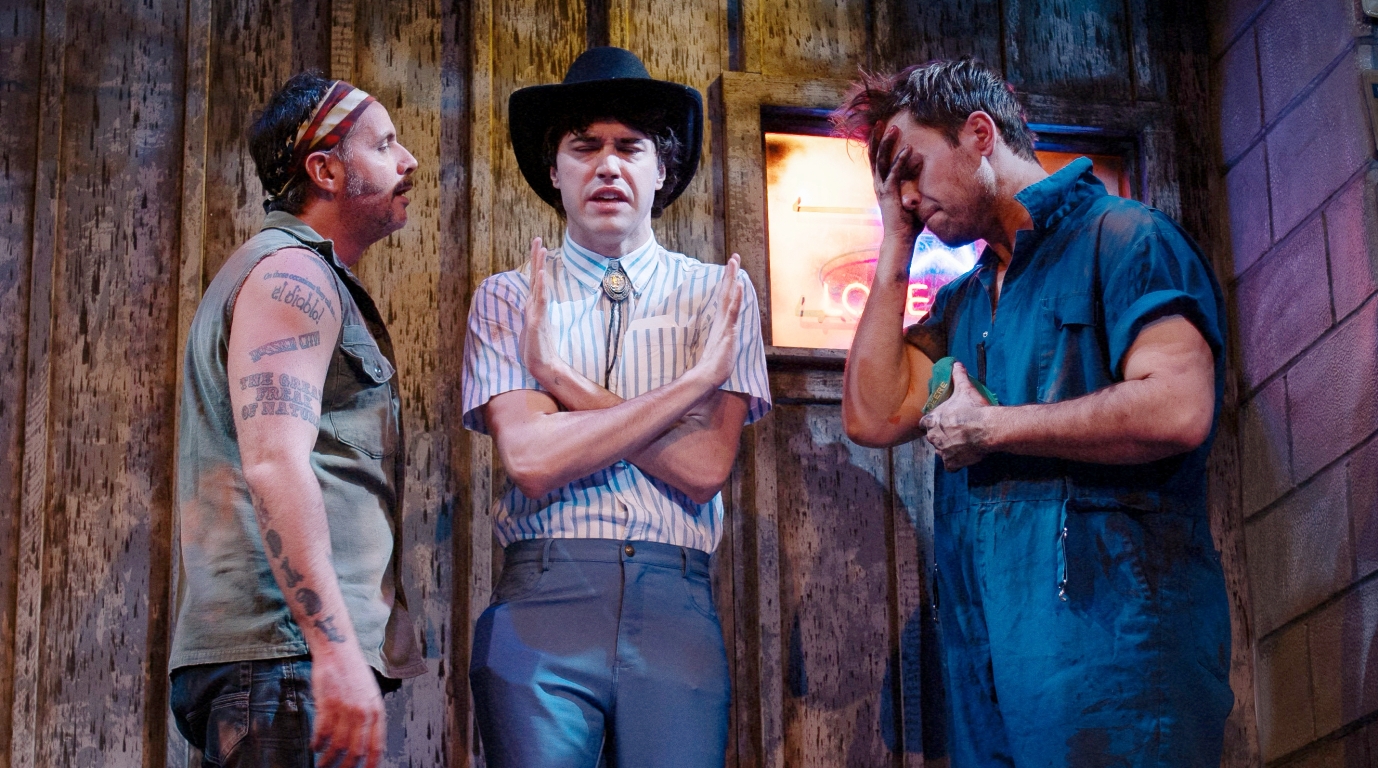LONE STAR
by James McClure
Directed by Joe Rosario
Theatre Row
Official Website
Reviewed by David Spencer
A friend of mine says of productions featuring conspicuous messaging that “there’s a lot of ‘Get-It’ Guy in there”; shorthand for his contention that the creative team might just as well have hired an actor to sit on the edge of the proscenium and at salient points of messaging look meaningfully at the audience and say: “Get it? Get it? Get it?”
This is sometimes made manifest in over-egged staging, as with the spectacularly bad 1776 of two seasons back. But sometimes it comes packed in added material, interpolated from other sources.
Which is the case with Lone Star, on Theatre Row, a revival of the one act play by James McClure. Its multi-pun title refers to the state, the beer, and one of the two good ol’ boy brothers getting boiled on brew, in a reunion of sorts, after the slightly older (Matt de Rogatis), has come back from ‘Nam with memories he’d rather not have, to find that nothing he’d hope to come back to is as he left it; and his younger brother (Dan Amboyer) finds his attempts at consolation increasingly…complicated…by other factors. To particularize the rest is perhaps to spoil a story turn or two that you may not entirely predict, but you don’t really need to know much more than this: It’s basically intended as a comedy. And under the very decent direction of Joe Rosario, it’s fairly well-acted. Yet much of it occurs without its quota of laughs, and indeed occurs under a hovering cloud of melodramatic purpose that doesn’t really start to fade until a third character—a goofball that the older brother has terrorized over the years (Ryan McCartan)—enters, whose energy and persona bring with it the realization that, Oh! This is a comedy!
And why? Because, the better to create a full evening, the director has wrapped the one act with a prologue (entirely a monologue) and an epilogue (mostly a monologue) from yet another play, apparently Lone Star’s “sister” play (Laundry and Boubon) in which the combat veteran’s young, buxom, sexually vibrant, Mexican-born wife (Ana Isabelle) tells us all about what has become the strained relationship she has with him, especially in the wake of his return from the war. (In its original NYC debut, Lone Star was paired with another, separate play by McClure, Pvt Wars.)
Of course, this repurposing—also well-acted—is meant to serve as an introduction to the fellow we’re about to meet, but it doesn’t deepen our understanding of such dynamics—it’s all fairly boilerplate, even in its basic language—and more damagingly, it’s a portrait of frustration and marital discord, replete with her version of psychological profiling. Subsequently, it anticipates everything we would otherwise learn as we go when the actual play begins. We know the guy, we know why he’s troubled, we know what’s important to him, we know his joys, his disappointments…and so, bereft of the opportunity to meet him freshly, to discover him, we just watch him fulfill the pre-digested trope. In comedic terms, she explains the jokes before we hear the jokes. In other words: the added material is a subtext spoiler. And because your imagination and intuition are thus not firing as they should, it keeps you from engaging as much as you otherwise might.
There’s generally good reason why talented dramatists choose not to fill in all the blanks.
And it’s always a mystery to me when directors—variously talented—fail to recognize the gift of that.
